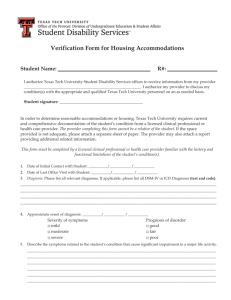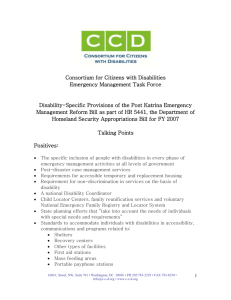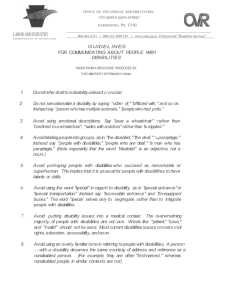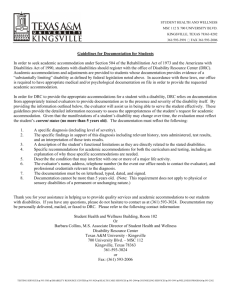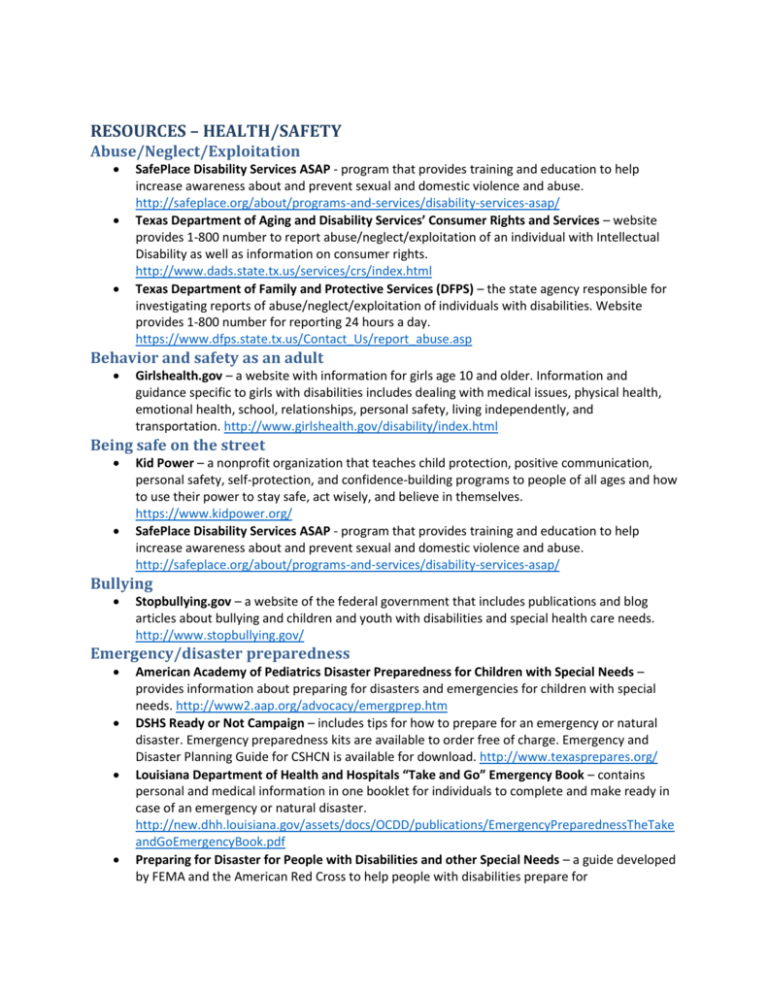
RESOURCES – HEALTH/SAFETY
Abuse/Neglect/Exploitation
SafePlace Disability Services ASAP - program that provides training and education to help
increase awareness about and prevent sexual and domestic violence and abuse.
http://safeplace.org/about/programs-and-services/disability-services-asap/
Texas Department of Aging and Disability Services’ Consumer Rights and Services – website
provides 1-800 number to report abuse/neglect/exploitation of an individual with Intellectual
Disability as well as information on consumer rights.
http://www.dads.state.tx.us/services/crs/index.html
Texas Department of Family and Protective Services (DFPS) – the state agency responsible for
investigating reports of abuse/neglect/exploitation of individuals with disabilities. Website
provides 1-800 number for reporting 24 hours a day.
https://www.dfps.state.tx.us/Contact_Us/report_abuse.asp
Behavior and safety as an adult
Girlshealth.gov – a website with information for girls age 10 and older. Information and
guidance specific to girls with disabilities includes dealing with medical issues, physical health,
emotional health, school, relationships, personal safety, living independently, and
transportation. http://www.girlshealth.gov/disability/index.html
Being safe on the street
Kid Power – a nonprofit organization that teaches child protection, positive communication,
personal safety, self-protection, and confidence-building programs to people of all ages and how
to use their power to stay safe, act wisely, and believe in themselves.
https://www.kidpower.org/
SafePlace Disability Services ASAP - program that provides training and education to help
increase awareness about and prevent sexual and domestic violence and abuse.
http://safeplace.org/about/programs-and-services/disability-services-asap/
Bullying
Stopbullying.gov – a website of the federal government that includes publications and blog
articles about bullying and children and youth with disabilities and special health care needs.
http://www.stopbullying.gov/
Emergency/disaster preparedness
American Academy of Pediatrics Disaster Preparedness for Children with Special Needs –
provides information about preparing for disasters and emergencies for children with special
needs. http://www2.aap.org/advocacy/emergprep.htm
DSHS Ready or Not Campaign – includes tips for how to prepare for an emergency or natural
disaster. Emergency preparedness kits are available to order free of charge. Emergency and
Disaster Planning Guide for CSHCN is available for download. http://www.texasprepares.org/
Louisiana Department of Health and Hospitals “Take and Go” Emergency Book – contains
personal and medical information in one booklet for individuals to complete and make ready in
case of an emergency or natural disaster.
http://new.dhh.louisiana.gov/assets/docs/OCDD/publications/EmergencyPreparednessTheTake
andGoEmergencyBook.pdf
Preparing for Disaster for People with Disabilities and other Special Needs – a guide developed
by FEMA and the American Red Cross to help people with disabilities prepare for
emergencies/natural disasters.
http://www.redcross.org/images/MEDIA_CustomProductCatalog/m4240199_A4497.pdf
Exercise
Centers for Disease Control Disability and Health – provides guidance and resources to people
with disabilities about healthy living, safety, assistive technology, school, independent living, and
finding support. http://www.cdc.gov/ncbddd/disabilityandhealth/
First aid
AAP PedFACTS Pediatric First Aid for Caregivers and Teachers – a course offered through the
AAP that focuses on what to do if a child becomes ill or gets injured.
http://www.pedfactsonline.com/
Mental health
ASK About Suicide to Save a Life – training videos that include information about suicide
warning signs, how to ask for help, information specific to veterans and LGBTQ, and Texas local
hotlines. http://www.texassuicideprevention.org/training/video-training-lessons-guides/askabout-suicide-ask/
Girlshealth.gov – a website with information for girls age 10 and older. Information and
guidance specific to girls with disabilities includes dealing with medical issues, physical health,
emotional health, school, relationships, personal safety, living independently, and
transportation. http://www.girlshealth.gov/disability/index.html
Special Needs Diversionary Program – a program that provides mental health treatment and
specialized supervision in order to rehabilitate juvenile offenders and prevent them from
penetrating further into the criminal justice system. Offered by the Texas Juvenile Justice
Department. https://www.tjjd.texas.gov/services/sndp.aspx
Texas Suicide Prevention Toolkit – provides a comprehensive guide to prevention, intervention
and post-intervention strategies in addition to local and state resources available in Texas.
Developed by Mental Health America of Texas, Texas Suicide Prevention Council, Texas Youth
Suicide Prevention Project, and Texas Department of State Health Services.
http://www.texassuicideprevention.org/information-library/texas-suicide-prevention-toolkit/
Sexuality
Girlshealth.gov – a website with information for girls age 10 and older. Information and
guidance specific to girls with disabilities includes dealing with medical issues, physical health,
emotional health, school, relationships, personal safety, living independently and
transportation. http://www.girlshealth.gov/disability/index.html
SafePlace Disability Services ASAP - program that provides training and education to help
increase awareness about and prevent sexual and domestic violence and abuse.
http://safeplace.org/about/programs-and-services/disability-services-asap/
Sexuality Information and Education Council of the United States – a nonprofit organization
that gives families, educators, and policymakers access to fact-based sexuality information
through publications, websites, trainings and other resources. http://www.siecus.org/
Other resources
Autism Speaks Transition Toolkit - a toolkit to assist families of youth with autism as they
prepare for the move to adulthood. Topics include self-advocacy, transition plans, community
living, employment, education, housing, legal issues, health, and technology. The site also offers
state-specific transition timelines. https://www.autismspeaks.org/family-services/toolkits/transition-tool-kit
Department of State Health Services (DSHS) Children with Special Health Care Needs (CSHCN)
Services Program – website offers resources about medical home, parent/youth transition
worksheets, transition assessments by developmental age, a listing of transition-related
websites, and a downloadable resource brochure. The website also provides a listing of summer
camps across the state and information about health care benefits offered by the program.
http://www.dshs.state.tx.us/cshcn/default.shtm
Maternal and Child Health Library – provides resource guides for families on topics including
specific conditions and diseases, mental health, adolescent health, and more. A project of
Georgetown University. http://ncemch.org/evidence/NPM-12-transition.php
Navigate Life Texas – a website created by parent of children, youth and young adults with
disabilities and special health care needs for parents. The site offers comprehensive information
for youth, families, professionals, advocates and others including dedicated pages with
information in Spanish and English on Sexuality, Mental Health, Bullying, Abuse and Emergency
Preparedness Planning. https://www.navigatelifetexas.org/en
Office of Adolescent Health (OAH) - Housed within the U.S. Department of Health and Human
Services, the OAH offers online resources and information for adolescents about reproductive
health, mental health, physical health and nutrition, substance abuse, and healthy relationships.
http://www.hhs.gov/ash/oah/index.html
Send comments or report broken links by e-mail to CSHCN Services Program.



